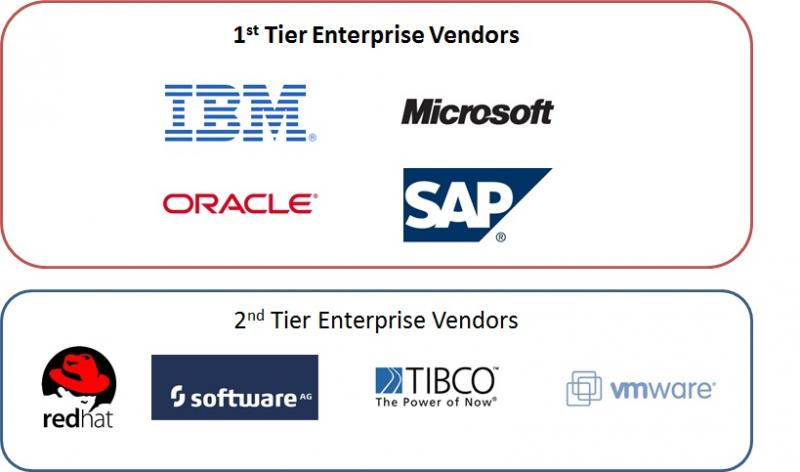Progress Software Lowers Its Sights
Clay Richardson, Mike Gilpin, and I collaborated on this blog post.
I don’t normally blog in response to news events, but I feel obligated to blog about Progress Software’s strategy shift, announced last week (April 25, 2012). The reason: Before the shift, Progress was an independent alternative to the top-tier vendors of enterprise application platforms (Microsoft, IBM, Oracle, and SAP); after the shift, it is not (see the figure below). Progress will now be a much more narrowly focused, specialist vendor.
Henceforth, Progress will provide its established OpenEdge application development platform (including OpenEdge BPM and a cloud-based version), its DataDirect Connect database drivers and integration tools, and its Apama (complex event processing) and Corticon (business rules management) platforms primarily for financial trading. Progress will no longer provide the following products, seeking to either sell them to other vendors or spin them out as independent companies:
- Savvion BPM
- Sonic ESB
- Actional services management
- Artix object request broker
- DataXtend data integration server
- FuseSource object request broker
- ObjectStore database
- Orbacus object request broker
- Orbix object request broker
- Shadow host integration products
That’s a long list of products to divest. Progress isn’t falling apart; rather, the company is making a second attempt to grow into an integrated enterprise vendor — this time with less baggage. In its first 25 years, Progress was a portfolio company selling technical components to other vendors. There was no “whole greater than the sum of the parts” for the company. The first attempt to weave Progress’ portfolio of products into a set of high-value enterprise solutions collapsed under the weight of all of those products, many of which were commoditized and not growing. Now Progress will focus on just three areas.
The transformation strategy is the same: Use products that generate strong revenue and profits but grow slowly (Open Edge) to fund investment in products with strong growth potential for the future (Apama with Corticon, DataDirect). The focus is just tighter this time.
The catalyst for Progress’ shift: activist investor Starboard Value LLP. Starboard’s public letter to new Progress CEO Jay Bhat laid out the ugly financial picture the company had become. PRGS rose substantially after the announced strategy shift, as you’d expect from the promise of a cleaned-up balance sheet. But the hard challenges of future growth remain. First, there’s still no value greater than the sum of Progress’ parts. Second, OpenEdge remains the core of the company’s revenue (and culture), and it is an old platform. Yes, Progress has added BPM and a cloud-deployment option to the OpenEdge platform. But the product remains primarily interesting to long-time Progress ISVs, not the broader market. Persuading the wide world of developers to even consider OpenEdge will be an immense task.
We see three major avenues to igniting long-term growth at Progress, none of which will be easy:
- Invest in rejuvenating OpenEdge as a modern enterprise platform. Progress faces tough competitors here, including Microsoft, IBM, Oracle, and upstarts like salesforce.com. Technical excellence isn’t enough to win in most of these competitive situations. Invest to sustain DataDirect for profitable growth, and use whatever resources are left to allow Apama/Corticon to continue to mine the fast-growing markets in trading automation and surveillance.
- Invest for sustainability in both OpenEdge and DataDirect while seeking hypergrowth by Apama/Corticon in a broad set of markets, including financial services, telecommunications, eCommerce, gaming, and security.
- Invest in sustainability for OpenEdge, DataDirect, and Apama/Corticon while acquiring new growth businesses.
Progress’ journey reminds us of the risks even successful enterprise software products and companies face. Corporate transitions are difficult, investors impatient. The thousands of customers using Savvion BPM, Sonic ESB, and the other products Progress is divesting now must hope and pray the products they depend on find stable homes. Most of these products were commercial successes in their day. Now each is a risky bet, despite its maturity and technical strengths. The situation reminds us of a key benefit of selecting a top-tier enterprise vendor: IBM and SAP rarely kill established products, and the same can be said of Oracle in recent years. Microsoft is . . . well . . . getting there. The leading second-tier vendors — Tibco and Software AG — also have good track records for sustaining products.

Now, approach Progress as a specialist vendor with three distinct products, not an enterprise platform provider. Progress has good products, but clients must include in their evaluations of those products the continuing business execution risk that the company will face during the next year. Progress is still in transition.